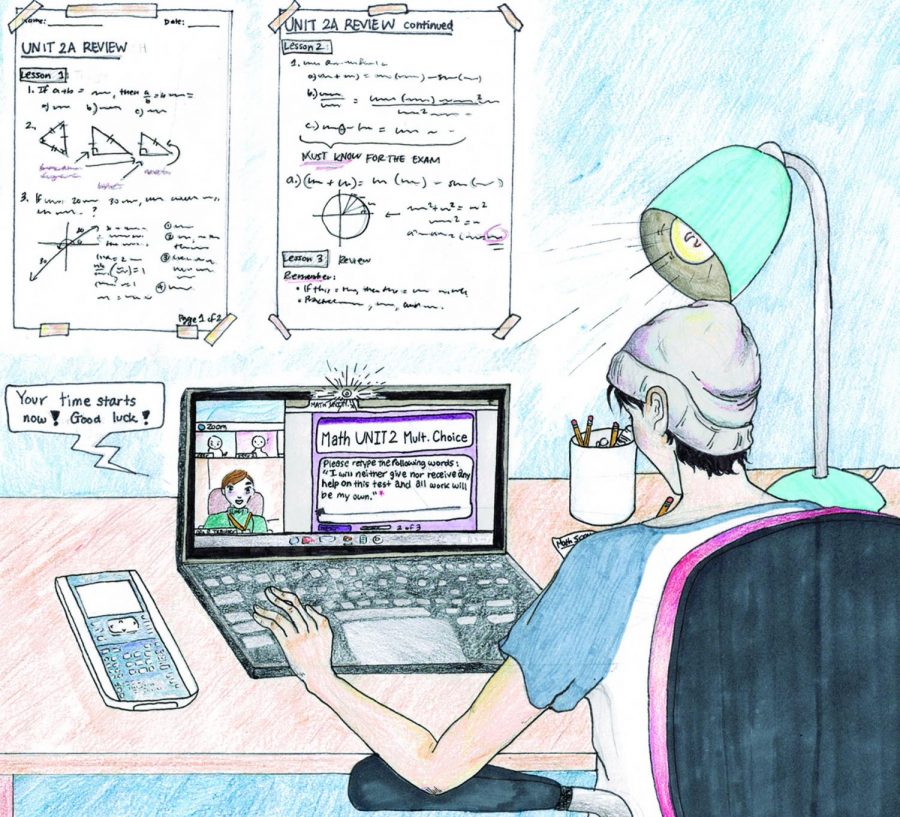Students find new ways to cheat during E-Learning
While taking a math test, a student used a second computer to search for the answers using an answer engine called WolframAlpha. After searching the test questions, the student was able to find the correct answers, along with calculations to support them.
The implementation of E-Learning at Glenbrook North has led to a change in learning environment, leading some students to find new ways to cheat.
A student, who wishes to remain anonymous to avoid potential disciplinary action, said in a phone interview that certain distractions, such as Xbox, cause the student to not pay attention in classes during E-Learning.
“Math was one of [those classes], so I just figured if I don’t pay attention I could just cheat on the test,” the student said.
Another student, who wishes to remain anonymous to avoid potential disciplinary action, said in a phone interview, “I [will cheat] if I am really unprepared or just completely forgot about the test happening.”
This student also said cheating during E-Learning is “just straight-up easier” compared to a regular school setting. The student feels it is easier to cheat during E-Learning because when learning in person, the teachers are usually watching students as they take exams. In an E-Learning environment, teachers can usually only see the student’s face, not the notes and monitors that may be out of the camera frame.
William Eike, assistant principal dean of students, said in a video conference, “We did anticipate students trying to maybe manipulate the system or cheat in different forms.
“[The deans] have found students utilizing other devices, we have found students manipulating the camera angle … and kids going back to the old way of just taking someone else’s work and plagiarizing. I’m sure [there are] many other imaginative ways kids might be [cheating], it’s just we have not had to deal with [those ways] as of yet.”
One student claims to have cheated by taping class notes up on a wall behind the computer. According to the student, the teacher had all students point their cameras down at their hands during the assessment, so the teacher could not see if students were looking at notes.
Another student said they cheated by using a dual monitor. Despite the student’s math teacher requiring students to show their hands, phone, calculator and paper in front of their camera, the student used a dual monitor to look at notes during assessments.
Camilla Roberts, president of the International Center for Academic Integrity, said in an email correspondence that there are many reasons why students cheat, including a pressure to succeed, students seeing others students cheating and trying to “make a level playing field,” students finding the material irrelevant and not wanting to put time into learning the material and students finding the course too hard or the workload too much.
“Many of these reasons are related also to stress,” said Roberts. “Stress can cause anyone to make decisions they might not normally make.”
History teacher Robert Gallivan said in a video conference that he either makes his students type a statement of honesty during assessments or he says a statement of honesty out loud to the class.
“There’s not much [teachers] can do other than to appeal to [students’] honor,” said Gallivan. “Your name’s all you got.”
According to Roberts, cheating in the classroom does not only affect the cheater, but also everyone else in the class.
“It affects the cheater because trust has been broken and respect between student and teacher shattered,” said Roberts. “It affects the other members of the class because they do see what has happened and they will see what the school [and] teacher does. If [other students] think the student is getting away with it, they might want to cheat as well.”
Students in stressful situations, like school, are often looking for a ‘‘quick fix’’ to their stress, Roberts said.
“What students fail to think about are the longer-term consequences of their actions,” Roberts said.


